
Rural livelihood means equipping women with work they can easily do near or within their homes
Inclusivity and Sustainability in the journey of transformation
ICICI Foundation
Bridging gaps for sustainable livelihood,
ICICI Foundation is working on creating
value chains with end-to-end solutions
I
t is one thing to farm on well-ploughed land—for a bank, that would
mean to create, handle, channel and secure wealth in the already
well-watered segments of society. But as we see with the world and
India’s ongoing struggles to balance ‘lives’ and ‘livelihoods’ in the context
of Covid-19, no social pyramid can be healthy and stable unless the very
base is strong. That is why the ICICI Group, in its 65-year-long journey
in nation-building, sees its responsibility as extending way beyond its
traditional domain. Helping to mainstream the less-served India—the
vast tracts of rural India from which our cities draw their glitter—is a key
ambition for us. It is to take this legacy forward that we formed the ICICI
Foundation in 2008.

The mission goal is well laid out—“to promote inclusive growth”. That entails planning and executing focused initiatives in a few identified areas: “primary healthcare, elementary education, skill development and sustainable livelihood, financial inclusion and rural development”. As slogans, these seem general—our challenge has been to try and realise the goals in such a way as to bring the benefits of the mainstream to the hinterland. A measure of financial security, to begin with. The projects, therefore, include vocational skill training, rural livelihood programmes comprising agri-allied industries and improvised farming and other entreneurship initiatives.
“While the men migrate to the cities, the
women are left behind in the
villages. Our rural livelihood programmes are primarily around these
women. These include imparting financial literacy, such as opening bank
accounts and saving, teaching them to grow vegetables and awareness
sessions on hygiene. With women in the forefront, the cycle never halts,”
says Saurabh Singh, President, ICICI Foundation. Over half a million
individuals in over 2,000 locations pan-India have been trained till now.
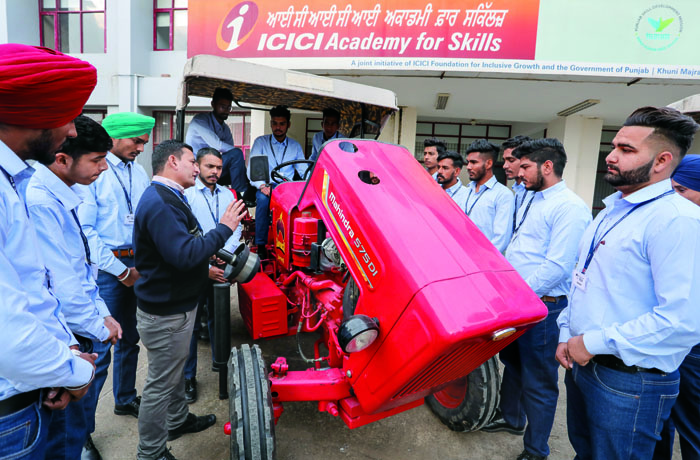
Tractor training in Punjab, state-of-the-art classrooms
It doesn’t have to be rural. The effects of capacity development can still be read at the individual level. Take Suhas Suresh Band, who lives in Mumbai. “I couldn’t complete my education due to financial difficulties. As an office helper, I used to serve tea and my monthly earning was Rs 5,000. Then a friend mentioned the ICICI Academy for Skills. I approached the academy and decided on the ‘AC Repair’ course. Now, I work as a technician and earn Rs 40,000 per month,” says Band, beaming. Like Band, there are many youngsters in the ICICI Academy for Skills in Mumbai whose lives have taken a turn for the better. The academy was born in 2013 with the aim of providing sustainable livelihood opportunities for lesser privileged youth in urban areas. So as to try and fill the skill gap at a pan-India level, the Foundation runs 27 centres offering ten technical and three non-technical courses across the country. Some are in partnership with the governments of Punjab, Haryana, Chhattisgarh, Madhya Pradesh, Uttarakhand, Uttar Pradesh and Jammu & Kashmir
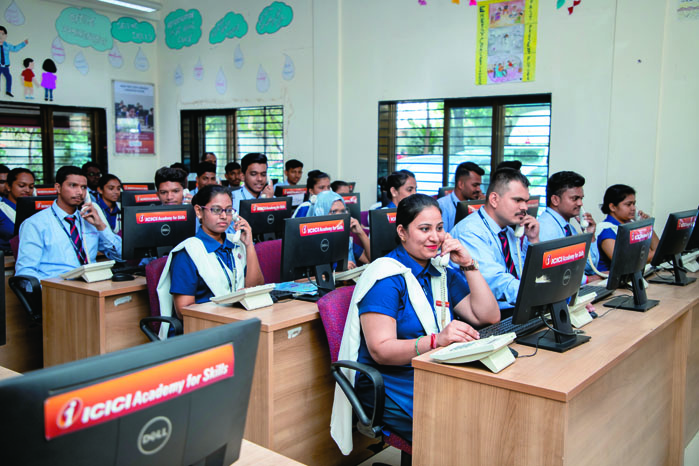
AC Repair course in progress at the Mumbai academy
The entire project is on a pro-bono basis, with the academy facilitating 100 per cent placement for its trainees. The 12- week courses have been designed in sync with industry needs. Imagine the real effect on lives from just the courses, and how they address real needs: Electrical & Home Appliance Repair, Refrigeration and AC Repair, Pumps and Motors, Central Air Conditioning, Paint and Application Techniques, Tractor Mechanic, Two and Three-wheeler Service Technician - Home Appliances, Assistant Beauty Therapist, Home Health Aide, Office Administration, Selling Skills, Retail Sales. The academy collaborated with industry experts—Schneider Electric, Bluestar, TVS, Mahindra, Tally, Akzo Nobel, Crompton, Enrich Salon, Care 24, Voltas, Godrej Home Appliances—for the curriculum, training and lab set ups.
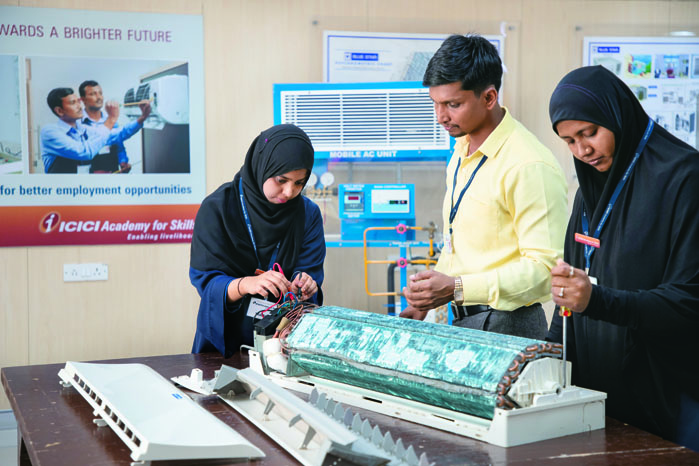
All the academies hold day-long classes
and have state-ofthe art labs. Punjab being an agrarian state, has a tractor
repair course too. The Foundation has over 1,300 placement
partners in sectors like BFSI, retail, ITES, healthcare and
manufacturing, including dealer networks in telecom,
automobiles and such like.
To benefit a larger section, the admission
criterion is
simple: the student should be minimum 18 years of age and
should have studied till class VIII. A basic aptitude test is
conducted only to identify the right course for the candidate.
The academy provides all the study material. Interestingly,
over 40 per cent of the trainees are women.
Besides classroom sessions, there is
comprehensive
practical training. The Foundation’s vast network means this
includes real on-job training, besides mock drills simulating a real work
environment, life skills training, personality development,
communication skills and financial literacy. There is full support and
mentoring for a year as the trainees make the transition to a professional
life. This is critical since many of the trainees come from families
where no one has ever worked in the organised sector.
Vouching for the change is Vaishali Jadhav from Thane, “I was a
housewife and life revolved around my husband and three kids. My
husband was burdened with the financial pressure, he being the sole
breadwinner. When I decided to join the beautician course at ICICI
Academy for Skills, he supported it. I joined the afternoon batch as I
did all the house work in the morning. It has turned out be the right
decision as I now have a monthly earning of Rs 50,000. I helped my
husband clear the debts.”
ICICI Foundation is a visionary in true sense, and
the inclusion of
Home Health Aide (HHA) course in the skill development sector is a
perfect example of the same. The world is witnessing a major health
crisis, and at a tough time like this, there is a constant need of
healthcare workers. The 45-day HHA course primarily focuses on
nursing and personal care of patients, along with learning the basics of
handling the elderly and people with disabilities. The course primarily
has passionate women trainees, who enroll with a minimum
qualification of standard VIIIth.
Take the case of Saima Sayyed from Mumbai.
“I live in a joint family
and have always been a helping hand to my parents and grandparents.
When I visited the ICICI Academy, I knew instantly that this was what
I wanted to do. It was an extensive training and now I am employed as
a caregiver with an app company. I treat four to five patients daily--it
could be anything from physiotherapy, bathing a female senior citizen
who has just been out of hip surgery or even a massage post a knee
operation. I am able to earn well. My parents feel good about my work
as they feel it is akin to welfare,” says a happy and radiant Saima
Sayyed.
Almost 28,000 students pass out annually and till now over 1,45,000
lives have been transformed through ICICI Academy for Skills.
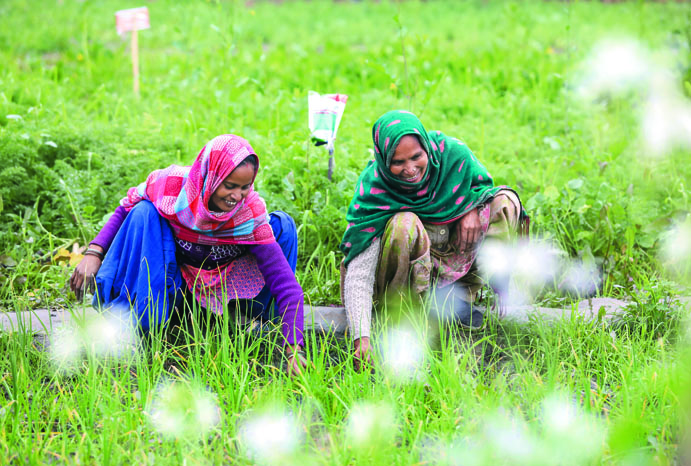
Landless farmers in Punjab have been trained
A rich variety of programmes comes under this initiative, for which the Foundation has partnered with experts for creating locally relevant entreprises. Different initiatives have been identified for different regions: such as mushroom farming in Chikmagalur district, banana bark in Namakkal in Madurai district, dairy farming in Jodhpur district. Other programmes include dress designing, backyard poultry, nursery upkeep and many more. These initiatives have helped in curtailing migration to the cities for work and also stabilised and enhanced monthly incomes for many who were earning only Rs 250- 300 per month. The rural initiatives are focused on the marginalized segments of the society and provide skill support to them.
The Foundation carefully created batches for transgenders and differentlyabled to train them to become self-reliant, thus leading the path to inclusive growth. Landless villagers have also been given support in many ways and in many states.
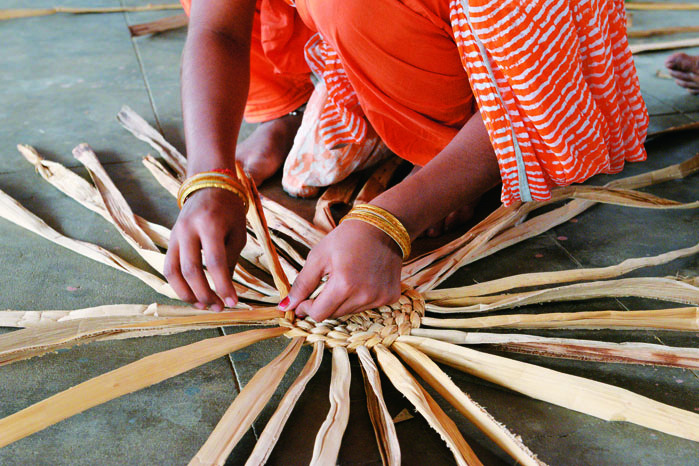
women are being skilled to make decorative items from banana bark in Namakkal
In verdant Chikmagalur, agriculture right now primarily revolves around coffee and pepper, but has a large number of landless labourers. These labourers did not have a consistent income through the year because work in the farms is required only for a few months. A survey revealed that the conditions were most suited for mushroom farming. Further, mushroom farming can be done with low investment, does not require high man hours or additional space or infrastructure. With expert guidance from Krishi Vigyana Kendra, women are given 45-day training, including field demos to develop capability for it. Other support, like opening bank accounts, linking them with rural schemes and concessions via different banks, is extended so that they can continue with this initiative. Thereafter, there’s mentoring and monitoring at every step, including creation of market linkages such as vegetable shops, supermarkets, homestays, wholesalers and hotels.
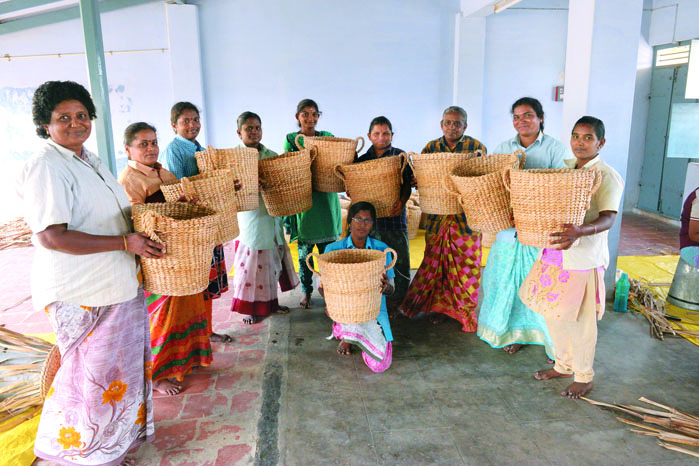
Baskets made out of banana bark in Namakkal
Jayanna Nettekerehalli, President, Taluk
Panchyat,
Chikmagalur, is very happy with the Foundation’s work. “This
is first of its kind initiative in Chikmagalur. With almost 456
villages and 47 gram panchayats here, most people work at
the coffee plantations. But it is a seasonal and one-time
activity. This programme is bringing a positive change. From
physically challenged to school dropouts and women,
everyone has found a new purpose in life.” In December 2019,
a group of 25 disabled ones was trained.
A dedicated batch on mushroom
cultivation for 30 specially
abled was conducted at Chikmagalur and was inaugarated by
M. Bagadi Gautham, DC Chikmagalur District.
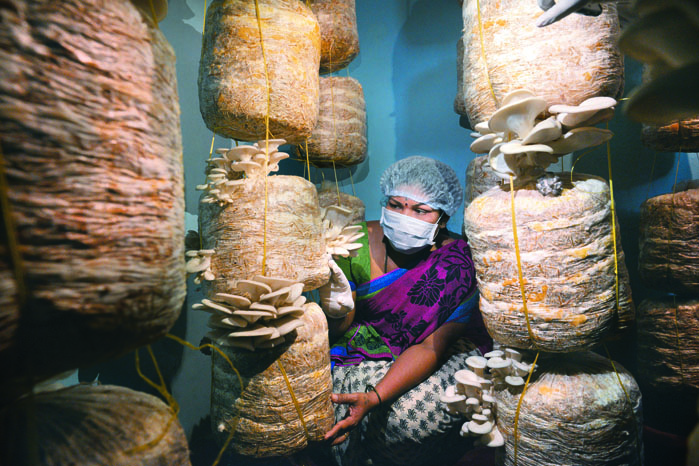
Mushroom farming is being taught in Chikmagalur and women have been given support to run a vegetable shop in Punjab
A kind of purposefulness now flows through the lives of those who have joined. Yasmeen from Aldur village has formed a Self-Help Group (SHG) with 10 women. As the head of the group, she ensures procurement of seeds, collection of the yield and sending the produce to the market. Other members cultivate the mushrooms. Ambuja Srinivas of Banakal village did the training in 2019. “My husband had lost his job and was always drinking. Loans had mounted and my husband’s health had also slid. But my venture has picked up. People in this region like eating mushrooms—it has become like a staple diet here. I have already managed to repay the loans. My husband supports me, my children have a better life and we are expanding our business,” she says. She started her business soon after her training in June 2019 and sold 18 kg in the first month. With over 750 kg sold till now, she also supplies products such as chips, sweets, flour.
The effect shows at another level. In Mudigere cluster, almost 1,516 kg of mushroom is now self-consumed. Result? Malnutrition mapping shows better health with more protein consumption.
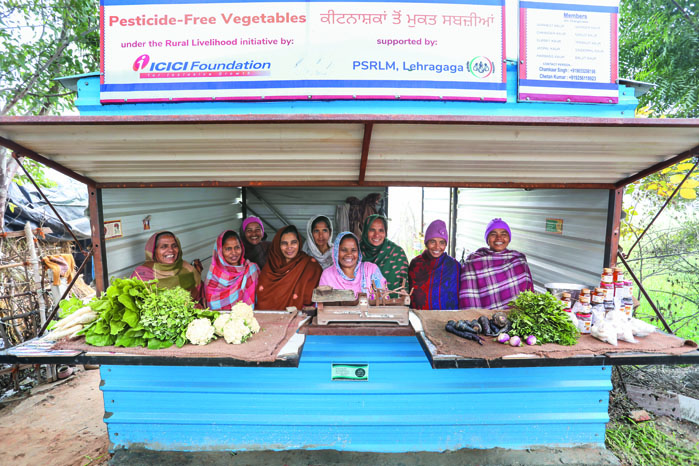
Mushroom farming is being taught in Chikmagalur and women have been given support to run a vegetable shop in Punjab
These women entrepreneurs have also been
trained and
encouraged to maintain their own kitchen gardens and have
been provided seeds. While the concept has been around on
a small scale in an unorganised way, this formal training has
helped the women to make a community kitchen garden,
since the houses are in clusters. This creates self reliance and
their ability to deal with any adverse situation
In Namakkal, in Madurai
district of Tamil Nadu, people
have been trained as nursery growers, in vermi composting,
banana bark processing, banana product making, paper bag
making, palm craft product making, multi-cropping and
more. Farmers are encouraged to use natural fertilisers to
improve the quality of the crop, leading to a better market
price. Almost 430 farmers are now cultivating 830 acres with
natural fertilisers; 42 vermi compost and 26 compost pits
have been established. Almost 545 farmers have
been trained in
organic farming and are cultivating the Poorvan variety of banana in
1,095 acres.
Bananas, though always in abundance, had never been linked to
optimal use—with the skills lacking to use the bark, it tended to be sold
off to middlemen at a lesser price. But ICICI Foundation trained the
women in Namakkal to make utility and décor items with banana bark.
Around 146 women have been trained by the Foundation, and 81
women are employed at local units. Each trainee now earns between
Rs 5,000-6,000 per month.
For Meenakshi Shanmugam of Melapattaipalayam
village, it has
been a life-saver. “I retired from an anganwadi a few years back and my
pension suffices for two meals only. My husband abandoned me and
took all my jewellery. My sons also threw me out as they see me as a
liability,” she says. “I saw the women taking training here and joined
this centre. I am unable to make many items but segregate the bark.
This is my family and I am able to earn Rs 3,500 per month. In fact, I
am now able to offer financial help to others as well.”
In areas of Punjab
such as Sangrur, Ludhiana and more, marginalised,
and landless female farmers have been trained for integrated farming,
floriculture, pig and fish farming. Women have been trained in soft toys
making, school uniform stitching, knitting, eco-friendly detergent. In
fact, for the first time, Sangrur district has 10 female farmers from the
SC community. They have been trained in integrated and organic
farming. Landless farmers from Changaliwala village, Sangrur district,
are now working on a piece of land leased from the panchayat. The
group is earning around Rs 30,000 per month and have set up a fresh
vegetable shop on the highway
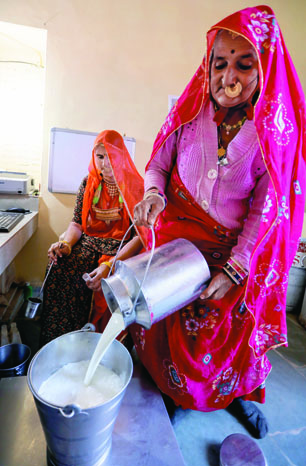
At ICICI RSETI, women are trained in scientific dairy farming
The focus of ICICI Foundation is always on
an overall socio-economic
development—with a view to enhancing both human capacity and
eco-friendly infrastructure. The ICICI Rural Self Employment
Training Institute (ICICI RSETI), which is in collaboration with the
Ministry of Rural Development, for instance, tries to create entrepreneurial
energies in the rural youth. The training here
enables them to set up their own enterprises in their respective
villages. There are two residential institutes—one in Udaipur and
another in Jodhpur—and 16 satellite centres.
The centres hold multiple
training programmes for farmers,
women, physically challenged and people in the adivasi belt—
Rajasthan’s rich (but economically impoverished) ethnographic
landscape making it an ideal site for the Tribal Initiative for Value
Additions (TIVA). The skill centres have short-term and mediumterm courses.
“I have been with ICICI RSETI for almost nine years
and seen tremendous progress—creating avenues for mobilisation
and placement in innovative ways such as nukkad natak, ratri
choupal. We have 35 students in a batch. Almost 4-5 batches are held
the year through. As these students come from varied backgrounds
and remote locations, we do some initial ice-breaking, personality grooming.
Around 60 per cent of the courses are for women: vastrachitrakala,
embroidery, even dairy and agriculture programmes. This
year, we are considering special courses for inmates of Jodhpur
prison, and initiatives for transgenders for their mainstreaming as
well,” says Surendra Singh Shekhawat, Joint Director, ICICI RSETI,
Jodhpur.
The physical infrastructure itself is in keeping with the overall eco-friendly ethos. ICICI RSETI Jodhpur, is housed in India’s first ‘Net Zero Energy-Platinum’ building. Rated by the Indian Green Building Council (IGBC), it is the first new building in the country to get the coveted certificate. It was inaugurated by Alka Upadhyay (IAS), Additional Secretary, Ministry of Rural Development, Government of India, and Girish Chandra Chaturvedi (IAS Retd.), Chairman, ICICI Bank Limited.
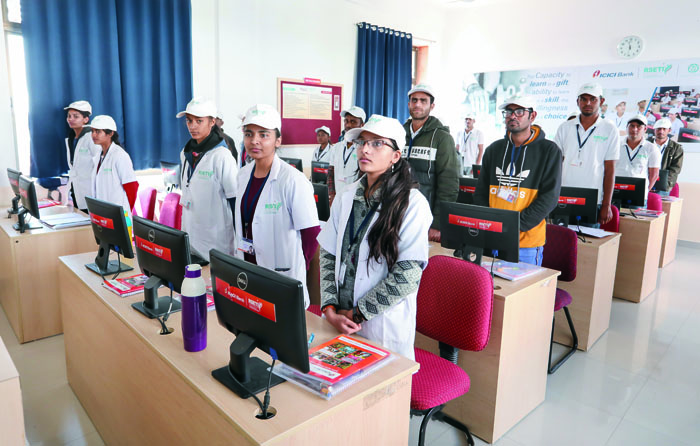
almost 40 per cent of trainees in other courses are women
The award is a recognition of the gamut of
features that enables a
sustainable environment at the building as it consumes less water,
optimises energy, conserves natural resources, generates less waste and
provides healthier spaces for its occupants as compared to a
conventional building.
With state-of-the-art facilities and
industry-benchmarked training
equipment, it is truly a structure depicting the best practices in
sustainable architecture.
Made of ‘chittar patthar’, a local sandstone
of Rajasthan, which is less
affected by extreme weather conditions, there are thick walls, stone
grills and open corridors for cooling effect. Besides, cool roof tiles
maintain temperature inside the building. Fully ventilated, there is
abundant utilisization of natural daylight, which is available in more
than 80 per cent of the functional areas of the building owing to its
special design.
There are environment-friendly installations,
such as a rooftop
solar-energy system and a fully natural phytoremediation sewage
treatment plant, which comprises a variety of shrubs and plants whose
roots clean the dirty water. The recycled water is used for flushing and
irrigation of the landscape within the premises. Rainwater harvesting
is done for water conservation and there is drought-tolerant variety of
landscaping with drip-irrigation facility.
Coming to the lighting, there is
LED-based lighting and stand-alone
solar-powered street lights for lighting the outer premises. Electricity
consumption goes down tremendously with deployment of star-rated
appliances, energy-efficient DC fans and an energy monitoring system
to ensure optimal utilisation of energy.
Keeping in mind the needs of all
the people, there are ramps and
toilets for the specially abled. All these well-thought out features
result in reduction of water and electricity consumption by 50 per
cent in comparison to a conventional building. brTo further expand the green
initiative, ICICI RSETI, Jodhpur,
started the Dairy Project, especially for the rural women
entrepreneurs of Bhopalgarh, who are into milk procurement,
collection and production. After doing a thorough mapping of the
occupations of the town, which clearly indicated issues like less
productivity, and awareness, a programme was conceptualised to
form a Farmer Producer Company
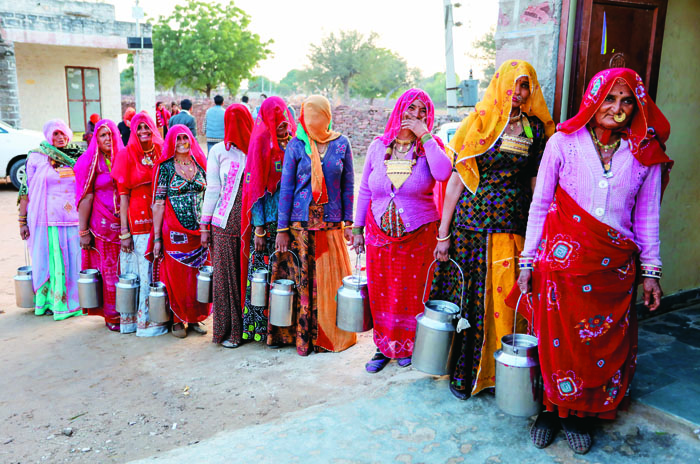
Dairy farming has brought about a revolution in Jodhpur
Under the dairy project, women have been trained not just on upkeep of buffaloes and cows, but also on skill upgradation like vermi-compost making, clean milk production practices and so. Most families in the rural belt keep buffaloes or cows at home. The milk was mainly self-consumed and some sold to middlemen. This is where ICICI Foundation stepped in, waking the women up to the fact that they could get enough milk for household needs and also commercial use. Once trained, women from villages like Bhopalgarh in Jodhpur district have opened a milk collection centre—Manasvi Agro Producer Company Ltd. Under this, milk is supplied to brands such as Amul and Sarthi. These entrepreneurs are now able to get almost double the price and more milk. In FY 2019-20, the brand conducted 54 training programmes and trained around 1,501 women farmers of this belt.
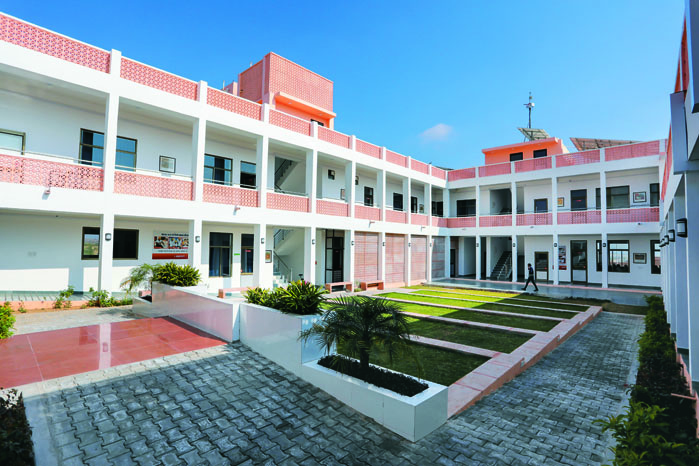
ICICI RSETI Jodhpur is India’s first ‘Net Zero Energy-Platinum’ building
Let’s put another human face on that. “I
studied till class V only. As a
daughter-in-law in a traditional family in Rajasthan, I was not allowed
to be in the front and had to keep my face covered. I never thought dairy
could be a commercial venture. As I don’t need to step out a lot, my
family and husband support this. Today, I am running a milk collection
centre in my village. I check the quality of milk that women bring. It
feels good to be independent,” says Geeta Devi. Manasvi also retails
seeds, organic fertilisers and by-products of milk.
With Geeta as an
inspiration, women have found a new way of life in
this area. One of her team member recounts, “Since I am uneducated, I
always felt that I wasn’t capable of doing any kind of work, except
household chores. But when I saw Geeta becoming a leader, I felt that I
too could contribute in some way. I take the best quality feed and seeds
from Manasvi for myself and many others. And I get a commission for
that. This way, I am able to earn and it has given me a lot of confidence.”
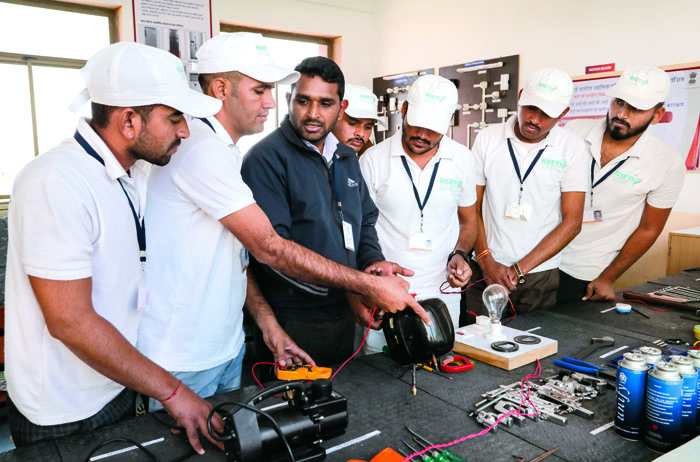
Young ones being trained in electrician repair course at ICICI RSETI, Jodhpur
What’s interesting is the fact that Manasvi has now opened an exclusive Rural Mart at Bhopalgarh with a sole purpose of benefitting the farmers in terms of a strong market link. The rural cluster otherwise had difficulties and were going all the way to Jodhpur for the farming essentials. Furthermore, ICICI RSETI is also supporting and encouraging these small scale rural women entrepreneurs in forming SHGs, so as to microfinance and self-promote their dairy business at the hamlet levels. The trained ones have now been linked directly with Manasvi Agro Producer Company Ltd, which was formally registered in August 2015. Even NABARD (National Bank for Agriculture and Rural Development) is supporting this project.
The Foundation aims to have a model district for skill development and livelihood by training over 1 lakh candidates by December 2020. The plan is to create 10,000 entrepreneurs with 300 per block. The journey has one ultimate goal: nation-building through distributed growth. The ICICI Foundation seeks to do that by enriching the social landscape in creative ways so that the fallow parts of society are enlivened
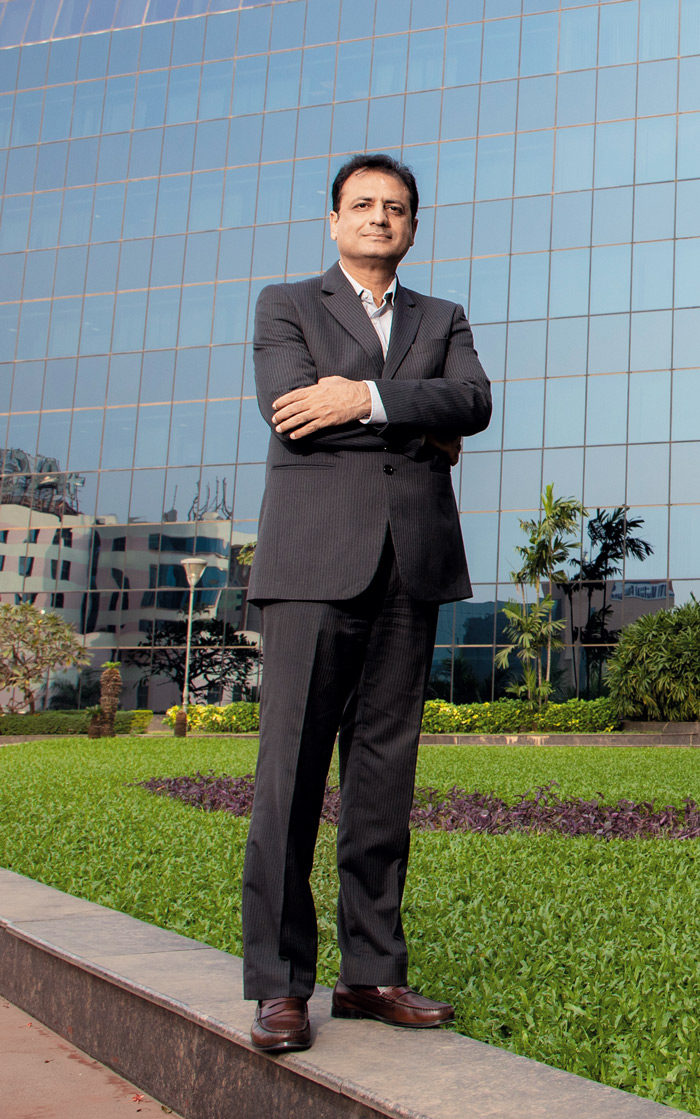
Saurabh Singh
President, ICICI Foundation
CSR is, in general, synonymous with ‘sustainable development’. But what is your specific approach to CSR?
The United Nations Development Programme is a role model for us. There are many philanthropists whose activities, commendable as they are, tend to be individualdriven. The majority of programmes are centred on healthcare, motherchild nutrition, education and financial independence, just to name a few. When I look at these programmes, I feel they can be approached from multiple directions. But my approach is in the reverse direction. My thought is that as per capita income goes up, habits change. To give an example, on pay day, mutton or chicken shops have long queues. This is an indicator that as income levels go up, consumption of protein will rise. This makes me look at the reverse—can I create livelihood around protein? If I start doing that, I’m taking care of both nutrition and jobs. At ICICI, we are thinking in terms of linking this to economic shortages or surplus, and creating a value chain. And then we can work for three to four years in a particular area. That would then be a sustainable model.
What are your focus areas?
Our focus is on livelihood. We have also begun to take up environmental issues. For instance, by asking: can an environmental concern be converted into a livelihood opportunity? We are not working in small numbers and we work on a value chain format—the ability of the chain to multiply is very high. With limited CSR funds, you will see us impacting a large section.
How does the Foundation execute the projects?
The rural areas have a certain social structure that has been stable for centuries. Our aim is to simply join the dots and make a positive impact on their lives. But without getting to know the system, it’s not possible. The first step is to have the support of the sarpanch or gram pradhan. We identify the professions people are practising and enhance them with a sustainable commercial value chain. .
What is the next big step?
Our focus is only on long-term programmes. We identify high potential initiatives, as we did with custard apple farming in Udaipur district, Rajasthan. This has been grown there forever, is organic and available on highways for Rs 40-50 per sack. And it costs Rs 150 per kg in the cities! We realised this could be a game-changer for the region. Our team approached the ice cream industry, such as Vadilal Industries and Natural. They agreed to buy the produce—but needed around 500 tonnes, and the natural produce was around one to two tonnes. Our work is to bridge this gap. So, we taught the farmers how to pluck and cut the fruit. We bought the cutting tools for them. Then replaced sacks with crates, trained them in grading and sorting. Pulp extraction is a manual process, so around 90 women have been trained for this. We don’t believe in short-term results that die out.
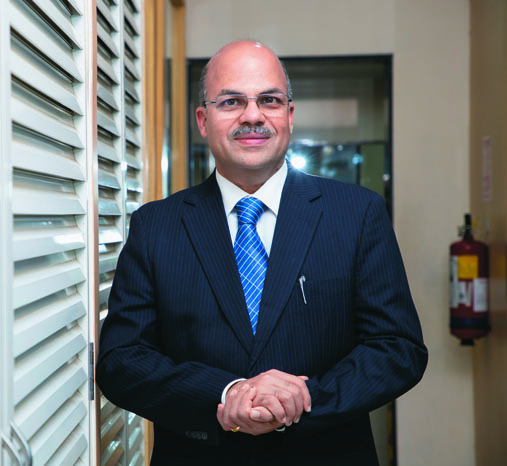
Anuj Agarwal
COO, ICICI Foundation
How has ICICI Foundation evolved?
ICICI Group has a legacy of working in the social sector. The group has been doing this for the last five decades. ICICI Foundation, as an entity took birth about a decade back. Since then, we have been evolving as we learnt and adapted to emerging conditions. In 2013, it was seen that there was a significant gap in the availability of skilled manpower to fuel the growth of our country. This opportunity was identified and we introduced ICICI Academy for Skills, skilling the youth from underprivileged section of the society and facilitating their placement in the organised sector. This helped in connecting youth with the available jobs, through a proper skilling programme. We also wanted to assist the rural population through skill development. During 2016- 17, we started the Rural Livelihood programme which aims to enhance livelihood at their respective location through skilling and market linkage.
How did you scale up the ICICI Academy for Skills?
We began the journey by creating our first Academy at Jaipur in October 2013. In order to serve a larger segment of the society, it was decided to take this model across the country. Since our focus is livelihood, we undertake a proper evaluation process. For any new Academy being set up, we study the employability and potential of different skills in that respective area, on the basis of which we finalise the courses which can be offered there. We reach out to employers, industry bodies, state governments who are key stakeholders in this activity of societal benefit. Seven of our Academies are under PublicPrivate Partnership with respective state governments.
Over time, besides the change in skills and earning, what are the other intangible benefits that you have seen in the communities?
Intangible benefits of these programmes are something which are not ‘visible’ but are huge. There is a physical as well as emotional upliftment in these individuals, many of whom were unsure of what they would want to do in future. If you interact with any of our trainees, you can see the change. Money is one important part but the improvement in self-confidence is remarkable. Many were school dropouts with no hope of a future. We have seen them come out of a situation where they felt like ‘a nobody’ to ‘someone who has a social standing’. This empowerment also leads to personality transformation which is quite extraordinary. Some of the women coming to the academy are widows with children. They have experienced rejection by society and their family. At ICICI Academy for Skills, they feel empowered with skills and employment. And the entire process of catalysing this change creates motivation for all of us. Once they are financially independent and empowered, they themselves become examples for others in their community. For us, we measure our success with their rise.
What is the long-term vision of the foundation?
India is a vast country with tremendous potential and opportunities. Considering a combined impact with all our initiatives, i.e the ICICI Academy for Skills and ICICI Rural Livelihood Programmes, we reach out to over 1,00,000 people annually. We see a tremendous potential with our value chain and entrepreneurial formats. When an individual works with an objective of having a permanent income and generating profits out of his venture, then the cycle is self-sustaining. We have a couple of pilot projects such as custard apple value chain in Rajasthan and banana plantation in Tamil Nadu. We are now expanding these formats into other regions including the northeast part of our country. This will help us scale up faster and helping many more individuals for a sustainable livelihood. These projects will be combined with other Social and Environmental projects to be able to serve the society better with long-term impact. By creating these growth engines in various parts of our country, including rural areas, we can have a distributed, inclusive and sustainable growth in our countr




